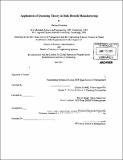Application of queueing theory in bulk biotech manufacturing
Author(s)
Donohue, Michael (Michael Tiahrt)
DownloadFull printable version (3.271Mb)
Other Contributors
Leaders for Global Operations Program.
Advisor
Charles Cooney and Steven Spear.
Terms of use
Metadata
Show full item recordAbstract
One of the most challenging problems in Amgen's biological manufacturing facility is adhering to the daily schedule of production tasks. Delays in non-time critical tasks have been traced to temporary workload surges that exceed the production staff's capability to handle them. To quantify this effect, a method for creating an M/M/c queueing model that is specific for bulk biologic manufacturing processes was developed. The model was successfully validated by comparing the predicted results to the historical data for each of the five production shifts. A discussion of how to model different improvement programs is presented, and Amgen-specific data are presented. It was found that across-the-board task duration reductions will reduce the schedule deviation rate by up to 50%. Additionally, it is shown that implementing staff-cross training with other production areas will reduce the schedule deviation rate between 14% and 75%. Implementation aspects of these improvement initiatives in a regulated production environment are discussed.
Description
Thesis (M.B.A.)--Massachusetts Institute of Technology, Sloan School of Management; and, (S.M.)--Massachusetts Institute of Technology, Engineering Systems Division; in conjunction with the Leaders for Global Operations Program at MIT, June 2011. "June 2011." Page 42 blank. Cataloged from PDF version of thesis. Includes bibliographical references (p. 41).
Date issued
2011Department
Leaders for Global Operations Program at MIT; Massachusetts Institute of Technology. Engineering Systems Division; Sloan School of ManagementPublisher
Massachusetts Institute of Technology
Keywords
Sloan School of Management., Engineering Systems Division., Leaders for Global Operations Program.